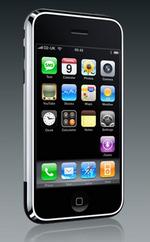Tag: apple iphone
Nokia debuts N97 Mini smartphone
Big day for Nokia today as it entertains a host of journos, analysts, bloggers and hangers on at this year's Nokia World conference. And straight off it has announced today's big story the mini version of its Nokia N97 top-end smartphone.
Why the Pre won't save Palm
Regular readers will know that we were fairly taken with the Palm Pre handset when it debuted to great fanfare at CES in January. It’s a touch screen device crammed with sensible features that uses Palm’s innovative new operating system, Web OS. In kinder economic times, it would be a sure-fire winner and enough to re-establish a once great brand.
But in spite of those green shoots you keep hearing about things are still brutal, especially in the smartphone market, and Palm has probably left it too late. There’s an interesting post in WallSt, a respected US financial blog, today that highlights 12 brands that won’t make it through the next 12 months. There’s good news – apparently Crocs, makers of those hideous plastic shoes, are on their way out, but the worst news of all for us techies is that Palm should in theory be toast by the end of the year.
Sure, it is only one blog’s opinion but, without the Pre and the recent injection of $100 million capital, the company would have disappeared anyhow. Its trading position is awful with the company only selling 482,000 handsets in its last quarter, down 42% from the same quarter the year before.
Can the Pre save the day? Well it has mountains to climb and here’s why…
1.) Bad choice of partners
In the US, Palm is with Sprint which is the third most popular carrier. It’s been haemorrhaging subscribers for a while and is definitely in need of some high profile handsets. However, it probably won’t have the reach to ensure the Pre gets enough market share. In Europe the deal is apparently with Telefonica (though I could find no confirmation of this) the company which famously already has a certain iPhone on its books. Even if it has fantastic reasons to sell the Pre, I can’t see it pushing it too hard against its golden handset.
2.) Handset market is too crowded now
In the US, Palm is up against Blackberry, which is rapidly making in roads into the consumer space, and Apple which is obviously doing amazingly well. In the UK, add to that list Nokia, with its new range of N series handsets, plus touch screen smartphone lite models from the Koreans and HTC’s Windows phones, and the competition looks fierce. That’s without even considering exactly how big a splash Android is going to make when they finally launch more than just the one handset.
3.) Apple and Blackberry users are not going to buy a Pre
Both brands command huge loyalty leaving the Pre a smaller slice of the cake to shoot for. Enough said.
4.) Palm probably doesn’t have enough money to market the Pre as it would like
With those crippling losses there’s probably less to spend on online marketing. If Palm could push the device online, then at least it would have a chance to compete. Unfortunately, its rivals are still relatively cash rich; for example Samsung spent £27 million on advertising in the UK last year and is expected to spend more this time around.
If Palm does go, I will be rather sad. Over the years, I have owned a string of Palm devices, including some by its off shoot company Handspring, that uses the Palm OS. Also, for a time in the early noughties Palm’s PDAs were as cool as handheld devices got. I am guessing that there might be a taker for its new OS, but we’ll have to see about that.
WWDC 2008: Apple 3G iPhone free on O2, £100 upgrade for existing owners
Ok, so we don’t take as gospel everything TechCrunch UK says, but they have it on, ahem, good authority, that the 3G iPhone will be available free to O2 customers. Apparently it will ship on July 12th and will come gratis with an 18 month contract. No word yet on minimum monthly fees yet.
Apparently existing iPhone owners will be able to upgrade…
Pictures of the iPhone 2.0 – sorry, just an unofficial concept design
With Apple’s WWDC and, more to the point, the new iPhone grand unveiling just around the corner, Japanese designer Isamu Sanada has come up with his own take on what he’d like the iPhone 2.0 to look like…
Opinion: Why Apple's iPhone won't beat Sony's PSP and Nintendo's DS at their own game!
Jonathan Weinberg writes… Mobile phones will never, ever, be portable games consoles. Nokia tried it with their N-Gage device, and they are trying it again with N-Gage software on their normal handsets. Gizmondo (while not strictly a phone) tried it – and failed miserably.
Now Steve Jobs has set his sights on trying to battle Sony and Nintendo for a slice of the portable gaming industry by opening up the iPhone to top-notch titles.
It’s a nice soundbite, it’s a good offering for Apple consumers, but it will still only ever be a mobile phone that you can play games on – rather than a games console. And they are, and always shall be, two totally different propositions and never the twain should meet…
Opinion: Is Apple a bigger danger to our lives than Microsoft?
 Jonathan Weinberg writes… I thought I could rely on Apple so this morning I awoke to disappointment in Steve Jobs after his Macworld announcements yesterday. I was sure he’d launch a new iPhone with either 3G or bigger storage memory, thus annoying the FOUR MILLION people who have now, like cult followers, signed up to the iPhone religion.
Jonathan Weinberg writes… I thought I could rely on Apple so this morning I awoke to disappointment in Steve Jobs after his Macworld announcements yesterday. I was sure he’d launch a new iPhone with either 3G or bigger storage memory, thus annoying the FOUR MILLION people who have now, like cult followers, signed up to the iPhone religion.
But it was a clever move. Save that announcement for a couple of months time, and bring a second-generation device out around a year after the first and no-one can have any complaints… can they? After all, technology is always changing and those of us who spend fortunes on gadgets and gizmos, only to see them bettered just weeks later, are fools of our own making. I do it, as much as you…
iPhone UK launch: How much does it really cost to own one?
 I’m not talking about the features here. I think anyone would agree that – lack of 3G notwithstanding – the features packed into an iPhone make it worth a few quid.
I’m not talking about the features here. I think anyone would agree that – lack of 3G notwithstanding – the features packed into an iPhone make it worth a few quid.
And with Steve Jobs announcing that they’re not even going to bother with the 4GB model over here but go straight to an 8GB model for £269 (only about £70 more than the US using the current exchange rate which is unusually generous for the UK as it’s essentially VAT plus a small premium for UK business costs).
Resistance: Fall of Man controversy continues and rumours of iPhone delays: the best stories from Shiny Media
 – The controversy over Resistance: Fall of Man continues. The Church is now appealing directly to the people of Japan [PSPSPS]
– The controversy over Resistance: Fall of Man continues. The Church is now appealing directly to the people of Japan [PSPSPS]















